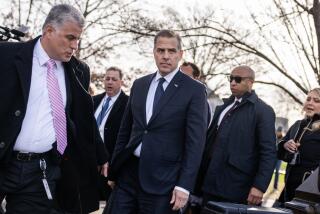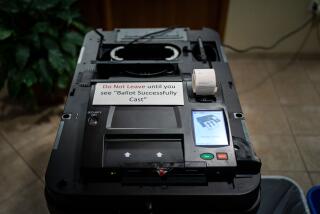Computer Virus Suspect’s Files Seized by FBI : Search Warrants Focus on ‘Hacker’ at Cornell; Charges Still Unclear
- Share via
WASHINGTON — The FBI disclosed Wednesday that it was seizing magnetic tapes, mathematical notations and all computer accounts of Robert T. Morris Jr., the graduate student at Cornell University who is suspected of unleashing the “virus” that spread havoc in computer systems across the nation earlier this month.
The records were described in federal search warrants filed in upper New York state, the first court documents to surface in the case. Copies of the warrants were released by authorities in Washington.
Morris, 23, has told associates that he designed the virus that disrupted two interlinked, government-operated computer networks for three days. He reportedly also has said there was a programming error and he did not intend the virus to rapidly replicate itself in systems throughout the nation.
University Files Sought
The search warrants, filed in federal court in Syracuse, N. Y., said that FBI agents were seeking two nine-track magnetic tapes in so-called “Unix Tar” format that are labeled “Files from Morris Account Including Backups.” The files were in the custody of Cornell officials, according to the warrants.
Knowledgeable sources said Morris apparently took advantage of known defects in the Unix operating system that controls individual computers in the networks to insert a virus that shut down the networks for three days.
Thomas A. Guidoboni, Morris’ Washington lawyer, would not comment on the search warrants Wednesday because, he said, he had not yet seen them. Guidoboni has not made Morris available to the FBI for interviews.
The sweeping nature of the FBI’s court-authorized search was noted in one attachment to the warrants that asked for “any and all computer accounts of Robert Tappan Morris at Cornell University from August, 1988, to Nov. 8, 1988, including but not limited to backup tapes and hard copy of information previously on line and off line.”
No Motive Ventured
Also being sought were “two yellow legal pads with calculus and assorted notes,” apparently Morris’ design for inserting the virus into national systems. Although Morris is the only suspect in the case, no motive has been suggested.
An associate of Morris said that the FBI’s search of records goes back to August only because that is about the time Morris, who completed his undergraduate studies at Harvard University, enrolled at Cornell.
The warrants contain only a description of records the FBI was seeking. The bureau later must file reports on what it found. An affidavit in which federal authorities described the reasons for the search was kept under court seal.
Because such computer-related “crimes” are a relatively new area of law, U.S. attorneys still are unsure how they might proceed. One obstacle to conviction may be that Morris apparently did not act with criminal intent, some legal experts have suggested.
One offense the FBI is considering--malicious mischief involving government communication lines, stations or systems--appears not to require the government to prove criminal intent, said FBI Director William S. Sessions.
Besides malicious mischief, which carries a maximum penalty of 10 years in prison, Sessions has said that fraud by wire, punishable by up to five years in prison, might also be charged.
More to Read
Sign up for Essential California
The most important California stories and recommendations in your inbox every morning.
You may occasionally receive promotional content from the Los Angeles Times.










